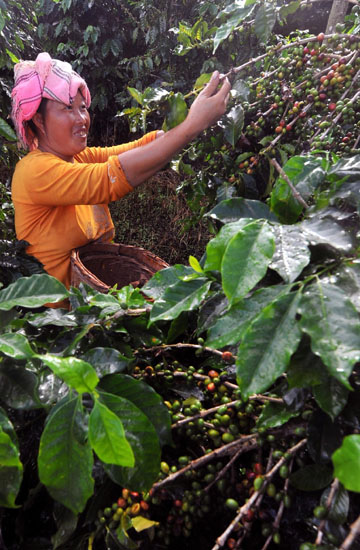Coffee beans from Kenya or Jamaica are much more famous, but it takes at least one month for them to pass through China's customs. Now that Yunnan also produces good quality Arabica coffee beans, why not try a cup that is made using freshly roasted coffee beans, he suggested.
|
 |
|
A farmer working at the farm owned by AiniCoffee Group, the biggest coffee brand in Yunnan province. The provincial government has set a target to expand the local coffee growing area to 607,000 hectares by 2020. The coffee growing area in Yunnan now exceeds 404,686 hectares, according to the Yunnan Coffee Association. [Photo/China Daily] |
The Yunnan provincial government hammered out a comprehensive plan to develop the coffee industry into a strategic strength last year. It sets a target to expand the growing area to 607,000 hectares by 2020, to realize an annual output of 200,000 tons, estimated at 34 billion yuan.
The coffee growing area in Yunnan now exceeds 404,686 hectares, according to data from the Yunnan Coffee Association.
A total of 50,000 tons of Yunnan coffee beans were sold abroad in 2011. Although it only accounted for 0.6 to 0.7 percent of the global transaction volume, the figure is a record high in the history of the province's coffee exports.
French missionaries brought the first coffee seed to Yunnan in the 1890s and local people have been growing and drinking coffee since then.
Located in Southwest China, the geographic and climatic conditions in Yunnan are similar to those of Indonesia and part of Colombia - two areas famous for high-quality coffee beans. But few people know that China has its locally grown coffee in Yunnan and a coffee brand in the world market.
In Pu'er city, the local Pu'er tea has long been renowned for its unique fragrance and has long had a good reputation globally. However, the city's coffee beans, despite providing a top-level taste, have been virtually unknown elsewhere until now.
"It (coffee) was just a common beverage in our daily lives. We have drunk it since we were children but never thought it could be competitive in the international market," said Pu Na, 26, a Yunnan native.
People here grow coffee as a supplementary crop to corn or potatoes in the past. It was never industrialized, she said.
Yu Zhichang, a 35-year-old female farmer in Pu'er city, said she used to make her living growing potatoes and corn.
She has been planting coffee since 2000 on a small plot. In 2011, she started cooperating with AiniCoffee and expanded the growing area. Yu earned more than 60,000 yuan from coffee, much more than from growing other crops.
"I think I've found the way forward," she said.
Contact the writers at xieyu@chinadaily.com.cn and guoanfei@chinadaily.com.cn

